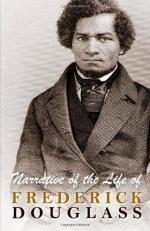For larboard aft, it would be marked thus—“L.
A.” For starboard aft, it would be marked
thus—“S. A.” I soon
learned the names of these letters, and for what they
were intended when placed upon a piece of timber in
the ship-yard. I immediately commenced copying
them, and in a short time was able to make the four
letters named. After that, when I met with any
boy who I knew could write, I would tell him I could
write as well as he. The next word would be, “I
don’t believe you. Let me see you try it.”
I would then make the letters which I had been so
fortunate as to learn, and ask him to beat that.
In this way I got a good many lessons in writing, which
it is quite possible I should never have gotten in
any other way. During this time, my copy-book
was the board fence, brick wall, and pavement; my pen
and ink was a lump of chalk. With these, I learned
mainly how to write. I then commenced and continued
copying the Italics in Webster’s Spelling Book,
until I could make them all without looking on the
book. By this time, my little Master Thomas had
gone to school, and learned how to write, and had
written over a number of copy-books. These had
been brought home, and shown to some of our near neighbors,
and then laid aside. My mistress used to go to
class meeting at the Wilk Street meetinghouse every
Monday afternoon, and leave me to take care of the
house. When left thus, I used to spend the time
in writing in the spaces left in Master Thomas’s
copy-book, copying what he had written. I continued
to do this until I could write a hand very similar
to that of Master Thomas. Thus, after a long,
tedious effort for years, I finally succeeded in learning
how to write.
CHAPTER VIII
In a very short time after I went to live at Baltimore,
my old master’s youngest son Richard died; and
in about three years and six months after his death,
my old master, Captain Anthony, died, leaving only
his son, Andrew, and daughter, Lucretia, to share
his estate. He died while on a visit to see his
daughter at Hillsborough. Cut off thus unexpectedly,
he left no will as to the disposal of his property.
It was therefore necessary to have a valuation of
the property, that it might be equally divided between
Mrs. Lucretia and Master Andrew. I was immediately
sent for, to be valued with the other property.
Here again my feelings rose up in detestation of slavery.
I had now a new conception of my degraded condition.
Prior to this, I had become, if not insensible to
my lot, at least partly so. I left Baltimore with
a young heart overborne with sadness, and a soul full
of apprehension. I took passage with Captain
Rowe, in the schooner Wild Cat, and, after a sail
of about twenty-four hours, I found myself near the
place of my birth. I had now been absent from
it almost, if not quite, five years. I, however,
remembered the place very well. I was only about
five years old when I left it, to go and live with
my old master on Colonel Lloyd’s plantation;
so that I was now between ten and eleven years old.




